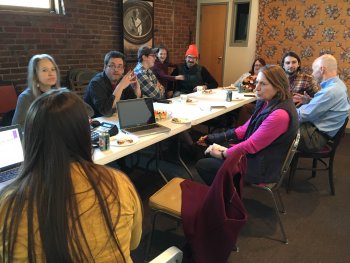Letcher Countians speak out against proposed federal prison
Last year, Congress approved funding for a new maximum security federal prison in Letcher County – the only new federal prison in the nation. The estimated preliminary cost of construction is $460 -$510 million. Rep. Hal Rogers has touted the prison as the main economic engine in eastern Kentucky.

In Letcher County, we have so much potential, and with the right investments could create local economic engines that serve our land and our people. The Letcher County KFTC Chapter does not believe that this prison offers the economic development that Letcher County deserves.
Local residents are joining together to voice concerns about the prison. Chapter members have formed a work team to participate and to highlight alternative economic drivers that would support a just transition for our region.
On April 1, the U.S. Bureau of Prisons (BOP) announced that it was forced to re-open a public comment period for the Environmental Impact Statement (EIS) on the prison in Letcher County after facing multiple shortcomings, including violations of public notice requirements, in its "Final EIS" released last July. A 30-day window is now open on a Revised Final EIS.
Mitch Whitaker, a local resident, recently had an op-ed published in the Lexington Herald-Leader about his concerns. Check it out, below, and keep on the lookout for more.
Op-Ed | Will federal prison keep E. Ky. locked in cycle of poor choices?
“In the 1980s, Kentucky Fish and Wildlife chose an old strip mine near Gordon to release several dozen deer as part of a deer-stocking program in Perry and Letcher counties. The state was reclaiming former strip mines by repopulating them with wildlife.
I was there when they turned the deer loose from the trailers. I lived – and still live – right below the old strip mine.
The wildlife on this 400-acre plot of land has greatly rebounded since it was stripped and reclaimed. I would know; I use 30 acres of it to rehabilitate wild birds of prey. With the help of the University of Kentucky Extension Office in Letcher County, our raptor rehabilitation program is the only one of its kind east of I-75.
That plot of land has directly contributed to the success of our program; it has supported me through retirement and it allows me to teach local children about the unique biodiversity of our region.
Now all of that is in danger.
The federal government, with the help of our United States representative, Hal Rogers, has announced that $444 million in federal funding has been allocated to build a maximum-security federal prison on the site.
The U.S. Bureau of Prisons is still determining land rights at this time, but has said that eminent domain will be used if negotiated sales are not reached.
I have large, old-growth oak trees on my land that will be cut for the construction of this prison. The Kentucky River, which winds around the site, will be disturbed with sedimentation from road construction to the facility. And the bird rehabilitation program that we have fought hard to preserve will suffer greatly.
But I won’t be the only one affected. All Letcher Countians will be forced to pay for this prison in some way. The property tax base of nearby McCreary County was greatly reduced when a federal prison was built there. In a desperate attempt to make up for the lost money, the county issued a payroll tax. There’s no reason to think that the same won’t happen here.
Are there better uses for $444 million in federal funding?
Sure there are. But we aren’t getting a say in how that money is spent. We could build a factory up on that site. We could build a solar farm and provide electricity to Kings Creek and Roxana for a hundred generations. But these are not the options being provided to us. Once that facility is built, the land will be fenced off to us forever, protected by armed guards and electric wire.
The local group that worked with Hal Rogers on getting this done, the Letcher County Planning Commission, has been alarmingly vague on the economic benefits of the prison. When asked for hard numbers on job growth and net economic growth, they go silent.
In fact, there are individuals on the commission who have great financial interest in seeing the prison built. These individuals are investing in building apartment complexes that they can then rent to prison guards who move here for work.
Is this a conflict of interest? Will the majority of Letcher Countians see any of that money, or will it remain in the hands of a few powerful people? It remains to be seen.
My story is a parable of the choices Eastern Kentuckians face in this period of economic transition. Will we honor the natural history and environmental assets of the region by preserving sites like this?
Or, will we continue the same path we’ve been on since the 1800s, when the only bone being thrown to us was coal?
This piece of property has already been imprisoned, and it’s just now getting back to the point of literal and figurative liberation. Why do it again?”
Recent News
Kentucky’s past legislative session showed alarming trend toward government secrecy
Churchill Downs takes more than it gives. That's why the Kentucky Derby is a no-go for me
‘We must never forget.’ Kentucky town installs markers for lynching victims.
Featured Posts
Protecting the Earth
TJC Rolling Out The Vote Tour – a KFTC Reflection Essay
KFTC Voter Empowerment Contractor Reflection Essay
Archives
- Home
- |
- Sitemap
- |
- Get Involved
- |
- Privacy Policy
- |
- Press
- |
- About
- |
- Bill Tracker
- |
- Contact
- |
- Links
- |
- RSS

